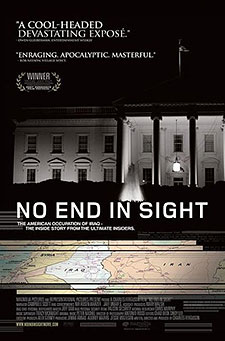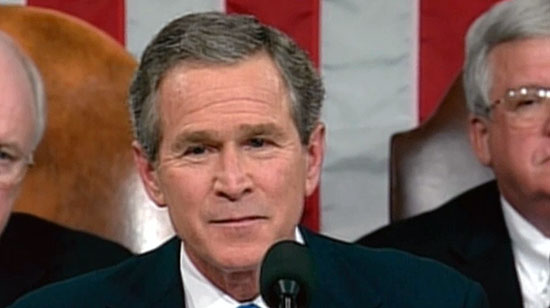
Baseball's Active Leaders, 2023
What Trump Said When About COVID
Recent Reviews
Everything Everywhere All at Once (2022)
Black Panther: Wakanda Forever (2022)
Doctor Strange in the Multiverse of Madness (2022)
Spider-Man: No Way Home (2021)
The Cagneys
A Midsummer Night's Dream (1935)
Something to Sing About (1937)
Angels with Dirty Faces (1938)
A Lion Is In the Streets (1953)
Man of a Thousand Faces (1957)
Never Steal Anything Small (1959)
Shake Hands With the Devil (1959)
No End in Sight (2007)
WARNING: SPOILERS
Charles Ferguson’s “No End in Sight” is the doc Fox News doesn’t want you to watch. It’s the era Fox News doesn’t want you to remember. It’s a time of massive, chest-thumping hubris, swagger, and general loutishness, and it’s all reflected here. I’ve watched it three or four times now. I’d make every American watch it if I could. This is our story. We made it happen. I know: not you. Not me, either. But we’re still part of the country that made it happen. It’s still on us.
Ferguson begins his doc near the end and ends it near the beginning, and both scenes, both quotes, are devastating.
The first is from Nov. 8, 2006, the day after the 2006 midterm elections, when Donald Rumsfeld finally stepped down as U.S. Secretary of Defense. His joie de vivre gone but his hubris undiminished, Rumsfeld said the following:
The great respect that I have for your leadership, Mr. President, in this little-understood, unfamiliar war, the first war of the 21st century. It is not well-known, it was not well-understood; it is complex for people to comprehend. And I know with certainty that, over time, the contributions you've made will be recorded by history.
Rumsfeld was right. The war was complex and little-understood; but it was little understood by him, and by Bush and Cheney and Wolfowitz and Bremer. They simplified it. They Hollywoodized it. They thought they were in one movie (John Wayne, WWII) when they were in another (“The Battle of Algiers”).
He was also right in this way: the contributions he and Bush and the others made have been recorded by history.
Henny penny
What’s always surprising about “No End” is how little it deals with the lead-up to the war: the bogus reasons we attacked in the first place: WMD, “We don’t want the smoking gun to be a mushroom cloud,” the conflation of al Qaeda and Iraq. This is awful stuff, criminal stuff, but Ferguson gives it maybe two minutes of screentime. Because worse stuff came later.
First, we didn’t have a plan for post-war Iraq. Not really. We didn’t prep for it. We didn’t study.
But at least the State Department crammed and came up with recommendations: “The Future of Iraq Project.” Unfortunately, under NSPD-24, control for post-war Iraq was given to the Defense Dept., and Donald Rumsfeld, who promptly ignored State’s hard work.
Rumsfeld also ignored the recommendations of Army Chief of Staff Gen. Eric Shinseki, who, before the U.S. Armed Services Committee, suggested we would need several hundred thousand soldiers to keep the peace in occupied Iraq, rather than the 100K or so Rumsfeld and Wolfowitz recommended as part of their newer, sleeker military. Criticized by Bush loyalists, Shinseki was immediately proven right.
The war proper began on March 20, 2003, and was effectively over by early April when Baghdad fell. But then the looting began.
Rumsfeld joked about it. “Stuff happens.” “Henny Penny, the sky is falling.” The “vases” thing. But it was real and it was—this word again—devastating. Iraq’s national museum wasn’t protected. Its national library and national archives were burned to the ground. Imagine if a country invaded the U.S. to save us from our own dictator and then stood around while our national archives and museums were looted? There goes the Spirit of St. Louis. There goes the Declaration of Independence and the Constitution. Americans might get pissed off. They might begin to wonder about their liberators.
“We’re Marines,” says Lt. Seth Moulton, one of the doc’s many effective talking heads. “We can certainly stop looting if that’s our assigned task.” But it wasn’t. It was the opposite of their assigned task.
Then came general lawlessness: kidnappings, rape, murder.
But at least we had a good team going in: ORHA, the Office for Reconstruction and Humanitarian Assistance, led by former Gen. Jay Garner, and including Col. Paul Hughes and Ambassador Barbara Bodine. Sure, when they arrived, the buildings had been stripped bare. “We had no phone lists,” Bodine says here, adding, “But we had no phones for a while, so ...” But at least they were smart and dedictated and knew something about the country they were in.
Except ORHA was then replaced by the CPA, the Coalition Provisional Authority, and Garner was replaced by L. Paul Bremer, who, like most everyone else suddenly in charge, had never been to Iraq, had no postwar reconstruction experience, and had never served in the military. Of course he spoke no Arabic.
As head of the CPA he made various disastrous decisions, such as granting foreign contractors immunity from Iraqi law (consider that for a moment), but Ferguson doesn’t even get to this stuff. That happened later. The more disastrous moves occurred within a month of his appointment. Before he even set foot in Iraq, he issued the following orders:
- He stopped the formation of an interim Iraqi government
- He created a policy of De-Ba’athification
- He disbanded the Iraqi military
The first edict meant the country remained occupied while its own people had no voice. So it was somewhat humiliating.
The second meant permament unemployment for 50,000 people—the very people who knew how to make bureaucracy and government work. So it made everything more inefficient at a time of great inefficiency. It also humiliated the people involved.
The third edict, disbanding the military, was, according to Ferguson’s doc, the worst of these decisions. In a time of anarchy and general lawlessness, the Iraqi military was one of the few organizations that could uphold the law and stem the chaos. Instead, we scattered them. We put 300,000 soldiers out of work. It humiliated the people involved.
And they had guns.
Reality-based
It’s horrific to watch. We get one bad decision after another. Our postwar Iraq experience is almost a test case in what not to do. It should be studied in this manner.
Maybe there was some rationale for these decisions, but the main architects of the war, Cheney, Rumsfeld, Wolfowitz, Bremer, et al., refused to be interviewed for this doc. Only Walter Slocombe, Bremer’s right-hand man, officially the Senior Advisor for Security and Defense to the CPA, bothered to show up. I’m sure he regrets it. He comes off horribly. Initially he’s smirking. Then he’s defending his awful, awful decisions. His eyes get shifty. By the end, he seems a hollow man.
So do I, to be honest. You know how devastated Father Vogler looks at the end of “Amadeus” after hearing Antonio Salieri’s long condemnation of God and man? That’s how I always feel at the end of “No End in Sight.” The doc is a testament to the dangers of hubris, of ignoring evidence, of having already made up your mind. Again, it should be required viewing. Because we may have moved on from Iraq, but a great portion of the country, a powerful portion, haven’t moved on from this mindset.
They were, in fact, bragging about this mindset even as people were dying. In 2004, an unnamed Bush aide, later identified as Karl Rove, told Ron Suskind the following in The New York Times Magazine:
We’re an empire now, and when we act, we create our own reality. And while you’re studying that reality—judiciously, as you will—we’ll act again, creating other new realities, which you can study too, and that’s how things will sort out. We’re history’s actors ... and you, all of you, will be left to just study what we do.
“No End in Sight” is, I suppose, a judicious study of the actors of the Iraq War, and the new reality that the Bush adminstration tried to create there. It failed miserably, obviously, and that failure had consequences, massive consquences, for millions of lives, even as Rove and others have gone on to create “their own reality” elsewhere. Even as Rove’s 2004 taunt has become the central precept of the GOP and Fox News.
Ferguson ends “No End in Sight” with Pres. Bush’s words in his 2003 State of the Union address, in which he said the following about the impending war:
We will bring to the Iraqi people ... food ... and medicines ... and supplies ... and freedom.
The audience applauds.

—February 17, 2014
© 2014 Erik Lundegaard







